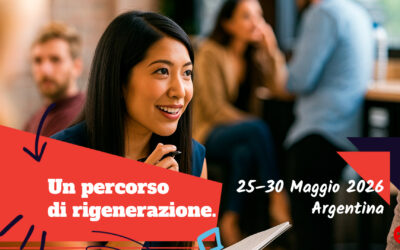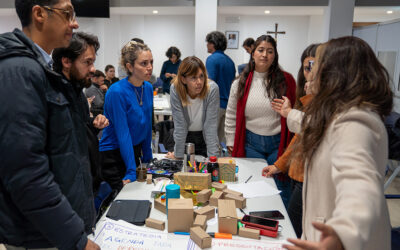 An experience of the Church as communion was what Maria Voce had at the Synod, ‘both in what was said in the hall and when we talked together as members of the same family.’ These were her words in an interview to the Italian newspaper the Avvenire at the end of three weeks of work. She added, ‘I have really given thanks to God for belonging to a Church like this.’ And she then went on to say, ‘Together we realized that human shortcomings get in the way of the new evangelization and we became aware that we should be purified from sin so as to find again the radical nature of our witness to the Gospel. A lot was said about the credibility of our proclamation, given in the first place by lives consistent with what they proclaim on the part of those called to evangelize, beginning with those with pastoral responsibility. All the same, from the work of the last three weeks, it became clear that in various parts of the world, including Italy and Europe, the general atmosphere of our communities is not totally downbeat because of the certainty that the Church is upheld by God and that therefore also our errors can be overcome. At the end of the day, what comes out of the Synod is a Church that is more trusting of itself because it has more trust in the Lord.’ This is a general impression that was reported in the Avenire, but various themes were touched upon in other interviews with the Focolare President. One was the role of women in the Synod and in the Church, mentioned with reference to its campaign for women’s rights in the news programme Tg2: ‘Can the Focolare Movement be an example of affirmative action in favour women in the Church?’ was the question put to Maria Voce who did not feel comfortable with the term, but said, ‘Ours is a presence in the Church where women have their role and having a woman as President is a sign of that.’
An experience of the Church as communion was what Maria Voce had at the Synod, ‘both in what was said in the hall and when we talked together as members of the same family.’ These were her words in an interview to the Italian newspaper the Avvenire at the end of three weeks of work. She added, ‘I have really given thanks to God for belonging to a Church like this.’ And she then went on to say, ‘Together we realized that human shortcomings get in the way of the new evangelization and we became aware that we should be purified from sin so as to find again the radical nature of our witness to the Gospel. A lot was said about the credibility of our proclamation, given in the first place by lives consistent with what they proclaim on the part of those called to evangelize, beginning with those with pastoral responsibility. All the same, from the work of the last three weeks, it became clear that in various parts of the world, including Italy and Europe, the general atmosphere of our communities is not totally downbeat because of the certainty that the Church is upheld by God and that therefore also our errors can be overcome. At the end of the day, what comes out of the Synod is a Church that is more trusting of itself because it has more trust in the Lord.’ This is a general impression that was reported in the Avenire, but various themes were touched upon in other interviews with the Focolare President. One was the role of women in the Synod and in the Church, mentioned with reference to its campaign for women’s rights in the news programme Tg2: ‘Can the Focolare Movement be an example of affirmative action in favour women in the Church?’ was the question put to Maria Voce who did not feel comfortable with the term, but said, ‘Ours is a presence in the Church where women have their role and having a woman as President is a sign of that.’  Another interview was with Vatican Insider which asked about dialogue with Islam, after the Synod had seen a video that had raised a number of questions. In words picked up also by the Washington Post, she said, ‘It was an occasion to put this theme [of dialogue with Islam] into focus, but it also served to show the aspect of Church as active in dialogue, a Church that goes out to meet the others, to other cultures around it – and thus to Islam as well, seeing it as made up of people who live cheek by jowl with Christians, who have the same problems and can seek to solve them together with Christians.’ Maria Voce was asked whether many Christians look at Islam ‘with fear and trembling’ and she said, ‘God guides history and so we must not be made afraid by the shifts and changes that happen. Maybe Islam grows in part of the world, while in another Christianity grows. The important thing is that humanity grows in humanity, that is, that people grow in their relationship with God and in the capacity to relate to one another.’ To the question whether Catholics can learn anything from Muslims, she replied, ‘I lived for ten years in country with a Muslim majority, in Turkey. I learnt respect for religion, faithfulness in observing one’s duty, the capacity to forgive during the period of Ramadan. Perhaps for us it only a word, but for them it is a sacred time in which to write off what may be owing, to renew family relationships. Above all I think it is possible to learn an attitude of faithfulness to God and to his commandments.’
Another interview was with Vatican Insider which asked about dialogue with Islam, after the Synod had seen a video that had raised a number of questions. In words picked up also by the Washington Post, she said, ‘It was an occasion to put this theme [of dialogue with Islam] into focus, but it also served to show the aspect of Church as active in dialogue, a Church that goes out to meet the others, to other cultures around it – and thus to Islam as well, seeing it as made up of people who live cheek by jowl with Christians, who have the same problems and can seek to solve them together with Christians.’ Maria Voce was asked whether many Christians look at Islam ‘with fear and trembling’ and she said, ‘God guides history and so we must not be made afraid by the shifts and changes that happen. Maybe Islam grows in part of the world, while in another Christianity grows. The important thing is that humanity grows in humanity, that is, that people grow in their relationship with God and in the capacity to relate to one another.’ To the question whether Catholics can learn anything from Muslims, she replied, ‘I lived for ten years in country with a Muslim majority, in Turkey. I learnt respect for religion, faithfulness in observing one’s duty, the capacity to forgive during the period of Ramadan. Perhaps for us it only a word, but for them it is a sacred time in which to write off what may be owing, to renew family relationships. Above all I think it is possible to learn an attitude of faithfulness to God and to his commandments.’
Love everyone
Love everyone





0 Comments